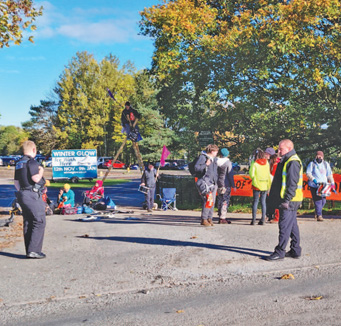A public order bill will come with a range of proposals to better protect the integrity of transport networks and fuel supply in England and Wales, making it a criminal offence to interfere with key national infrastructure, says the Home Office after such a measure was part of the Queen’s Speech last week.
Police will also be given the power to stop and search people and seize items intended to cause serious disruption by ‘locking on’ – for example gluing themselves to main roads, as done lately by climate change campaigners, or complex bamboo structures. This tactic is dangerous, and removing people safely is a significant drain on police, says the Home Office.
The Home Office admits to a rise in such protests in recent years, which it describes as highly disruptive. However such measures were previously blocked in the House of Lords, in the last parliamentary year, in the Police, Crime, Sentencing and Courts Act 2022 (PCSC Act), it complains.
Home Secretary Priti Patel said: “What we have seen in recent years is a rise in criminal, disruptive and self-defeating guerrilla tactics, carried out by a selfish few in the name of protest. Not only do these anti-social protests cause untold delays and misery for the law-abiding public wanting to get on with their lives, it tears police away from communities where they are needed most to prevent serious violence and neighbourhood crime.
“This bill backs the police to take proactive action and prevent such disruption happening in the first place. These measures stand up for the responsible majority and it is time that Parliament got behind them.”
What XR say
The Extinction Rebellion group however has stated that it will run its next round of protest in September. It calls its tactics ‘disruption and nonviolent civil disobedience’.
Charlie Waterhouse from Extinction Rebellion said: “It is foolish to think that announcing new curbs in the Queen’s Speech will stop people taking to the streets to demand their government act to ensure a safe future for people in the UK and around the world.”
In an earlier statement, covering the PCSC Act, the group spoke of how it and other laws aimed at the protesters were only ‘putting yet more pressure on courts that are already stretched and asking them to spend hundreds of hours dealing with nonviolent protesters’.
More detail
In more detail, the Bill proposes among other things that the Metropolitan and City of London police forces’ chiefs can delegate the powers to set conditions on protests to senior officers in their forces. Proposed are ‘serious disruption prevention orders’, on those with protest-related convictions or a history of causing serious disruptions at protests, whereby a breach of such an order would itself be an offence.
By key national infrastructure the Home Office cites rail (including the HS2 construction line), road and airports, newspaper printing presses, oil and gas refineries and power stations; all lately targeted by protest groups.
Photo by Mark Rowe: West Mercia Police and anti-defence industry protesters outside an entrance to the Three Counties Showground outside Great Malvern last autumn, while it was hosting the 3CDSE defence and security exhibition.










